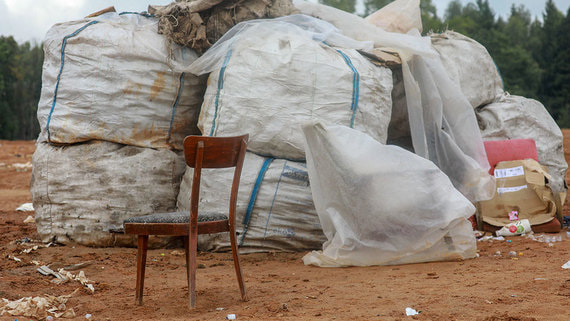The Constitutional Court instructed the legislator to determine the procedure for the liquidation of unauthorized dumps
[ad_1]

On May 30, the Constitutional Court announced its decision in the case on the procedure for liquidating unauthorized landfills, taking the side of representatives of municipalities who challenged the existing norms. Such a decision was sought by representatives of the city of Kodinsk, Kezhemsky district of the Krasnoyarsk Territory and the administration of the Novosibirsk region.
Municipalities considered it unfair that the legislator obliged them to clean up landfills in state-owned territories without providing funding. “The legislator should determine the ownership, distribution and sources of funding for the powers to eliminate unauthorized dumps,” the Constitutional Court ruled. Prior to this, the local authorities may be entrusted with the corresponding obligation, but subject to the court determining the amount of necessary funding from the federal budget or the budget of a constituent entity of the Russian Federation. “If the municipalities, after the announcement of this decision, execute such court decisions and clear the landfill sites completely at their own expense, then they have the right to reimburse the costs incurred from the federal budget and / or the budget of the constituent entity of the Russian Federation. The cases of the applicants are subject to review,” the decision of the Constitutional Court says.
In its decision, the court recalled that the waste management system in Russia is built on the interaction and participation of all three levels of government in it. At the same time, the affiliation and scope of powers of public authorities to eliminate landfills found on lands within the boundaries of municipalities, but not owned by them, are not clearly defined.
In this regard, the court also declared unconstitutional the challenged Art. 3.3 of the Federal Law “On the Enactment of the Land Code of the Russian Federation”, clause 18, part 1, art. 14 of the Federal Law “On the general principles of the organization of local self-government in the Russian Federation” and paragraphs. 16-18 of the Rules for the treatment of municipal solid waste, as well as Art. 10 and 51 of the Federal Law “On Environmental Protection”, paragraph 1 of Art. 22 of the Federal Law “On the sanitary and epidemiological welfare of the population”, paragraph 2 of Art. 9, pp. 1 and 2 Art. 13 of the Federal Law “On Production and Consumption Waste”, paragraph 18, part 1, parts 3 and 4, art. 14 and p. 14 h. 1 art. 15 of the Federal Law “On the general principles of the organization of local self-government in the Russian Federation.”
“This decision was expected by the whole country, all municipalities, especially in regions where there is a lot of land with unrestricted ownership – the Far East, Siberian territories,” Olga Bazhenova, a representative of Kodinsk, Ph.D. in law, told Vedomosti. According to her, as applicants, the municipalities are unconditionally satisfied with the decision of the Constitutional Court. In her opinion, now the state can delegate the necessary powers to municipalities with appropriate funding.
The current legislation does not directly impose on local self-government bodies (LSG) the obligation to eliminate landfills, and their officials do not have the right to draw up protocols on administrative offenses, hold them liable for violations of land legislation and issue binding orders, agreed with the applicants of the Constitutional Court. At the same time, in practice, it is they who are responsible for the maintenance of the lands located within their boundaries, even if state ownership of these lands is not delimited, and land plots are not assigned to a specific user.
According to the plot of the case, the regional operator for the treatment of municipal solid waste (MSW), Avtotransportnoe predpriyatie LLC from Kodinsk, cleared a site located on the territory of an urban settlement from garbage, and demanded 324,000 rubles for this. from the municipality. The courts agreed that the obligation to eliminate the unauthorized dump lies with the local administration, which is authorized by the legislator to dispose of state lands. The administration of the Novosibirsk region did not take proper measures to clean up the territory littered as a result of the life of the village of Borovoe (there is a resort area on the banks of the Ob reservoir). Then, at the request of the prosecutor, the courts ordered the local administration to liquidate an unauthorized dump on a site related to agricultural land.
The decision of the Constitutional Court is a serious step forward, says Andrey Maksimov, a member of the Public Chamber of Russia, chairman of the commission on territorial development and local self-government. In his opinion, the problematic situation for the municipalities was the presence of a gray area in the law, when the provisions of different norms do not really fit together and are not entirely clear to those who should implement them. “In this, it seems to me, the decision of the Constitutional Court is very logical,” Maksimov stated.
Earlier, Svetlana Razvorotneva, deputy chairman of the Duma Committee for Construction and Housing and Public Utilities, explained to Vedomosti that when the reform for the treatment of MSW began, the ideologists of the reform said that there would be no one’s land and the subjects would be divided into zones, and already within this zone the regional the operator will be responsible for all landfills. However, it turned out that, in accordance with the Land Code, if the person who caused this damage is not known, the municipalities, which simply did not have the money, should eliminate the damage.
[ad_2]
Source link






